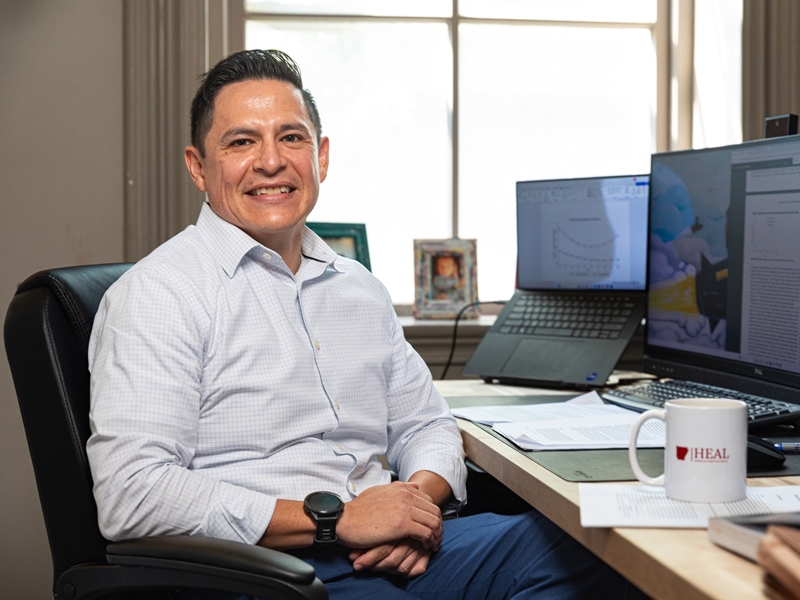Study Finds Probation Associated With Poorer Health for Black Americans
“Mistrust all in whom the impulse to punish is powerful,” warned Friedrich Nietzsche more than a century ago.
Instead, the impulse to punish appears to have grown more and more powerful in the U.S criminal justice system. Annually, more than 9 million people a year in the U.S. are arrested, and on any given day roughly 2.3 million are incarcerated, representing a 500% increase in the prison and jail population since 1980 (compared to a 46% increase in the population over the same time).
This level of incarceration has many consequences, including a direct impact on public and individual health. Contact with the criminal justice system has been associated with a number of poor health outcomes, including hypertension, depression and substance abuse disorders, as well as poor mental health, obesity and accelerated aging.
New findings published in the Journal of Criminal Justice now suggest that contact with the criminal justice system, particularly probation and probation in combination with incarceration, disproportionately affects the health outcomes of Black Americans.
“The argument that we make in the paper is that one — Black Americans are unequally or disproportionately exposed to criminal justice here in the U.S.,” explained Michael Niño, an assistant professor and corresponding author on the paper. “And two — when they are placed on probation, they have fewer economic and social resources to maintain all of the different responsibilities that are tied to probation.”
 |
| professor Casey Harris |
 |
| assistant professor Alexia Angton |
Niño and his co-authors in the Department of Sociology and Criminology at the U of A — Casey T. Harris, Alexia Angton and Meredith Zhang (now at Cal State LA) — made the case after winnowing through The National Longitudinal Study of Adolescent to Adult Health, more simply known as Add Health.
The Add Health study began in 1994 with a survey of 90,000 adolescents attending 132 schools about their health behaviors and contact with the criminal justice system. The initial group was then narrowed down to a pool of 20,000 representative students, who were reinterviewed periodically over the years, with the fifth and most recent time occurring between 2016 and 2019. The survey captured results on students who identified as Black, White or Hispanic.
Over the years, as adolescents settled into adulthood, the surveys charted the various ways respondents may have interacted with the criminal justice system, whether it was arrest, indictment, incarceration, probation or some combination of probation and incarceration (for instance, violating the terms of probation leading to incarceration).
From this data set, the researchers were able to make some very clear determinations: Black Americans consistently reported poorer health outcomes than their White and Hispanic counterparts when associated with contact with the criminal justice system. Moreover, probation proved to be the strongest driver of lower self-rated health and chronic conditions.
Why is probation so bad?
“It's incredibly stressful,” Niño said. “And that chronic stress of constantly having to think of how I'm going pay my probation fee, how I’m going to have to take urinalysis, I have to be here, I can't be here. And then also coupled with all of the other stressors that come with social life most certainly impact their health differently than it does other groups.”
He also emphasized that the majority of people under correctional control in the U.S. are on probation, but very little is actually known about the health consequences of it.
Moving forward, Nino and his colleagues will explore the long-term consequences of being exposed to different types of contact with the criminal justice system from early adolescence into adulthood. In particular, they hope to better understand what role race plays in that ongoing contact and how it impacts an individual’s health.
About the University of Arkansas: As Arkansas' flagship institution, the U of A provides an internationally competitive education in more than 200 academic programs. Founded in 1871, the U of A contributes more than $2.2 billion to Arkansas’ economy through the teaching of new knowledge and skills, entrepreneurship and job development, discovery through research and creative activity while also providing training for professional disciplines. The Carnegie Foundation classifies the U of A among the few U.S. colleges and universities with the highest level of research activity. U.S. News & World Report ranks the U of A among the top public universities in the nation. See how the U of A works to build a better world at Arkansas Research and Economic Development News.
Topics
Contacts
Michael David Niño, assistant professor of sociology and criminology
Fulbright College of Arts and Sciences
479-575-3205,
mnino@uark.edu
Hardin Young, assistant director of research communications
University Relations
479-575-6850,
hyoung@uark.edu
Headlines
PetSmart CEO J.K. Symancyk to Speak at Walton College Commencement
J.K. Symancyk is an alumnus of the Sam M. Walton College of Business and serves on the Dean’s Executive Advisory Board.
Faulkner Center, Arkansas PBS Partner to Screen Documentary 'Gospel'
The Faulkner Performing Arts Center will host a screening of Gospel, a documentary exploring the origin of Black spirituality through sermon and song, in partnership with Arkansas PBS at 7:30 p.m. Thursday, May 2.
UAPD Officers Mills and Edwards Honored With New Roles
Veterans of the U of A Police Department, Matt Mills has been promoted to assistant chief, and Crandall Edwards has been promoted to administrative captain.
Community Design Center's Greenway Urbanism Project Wins LIV Hospitality Design Award
"Greenway Urbanism" is one of six urban strategies proposed under the Framework Plan for Cherokee Village, a project that received funding through an Our Town grant from the National Endowment for the Arts.
Spring Bike Drive Refurbishes Old Bikes for New Students
All donated bikes will be given to Pedal It Forward, a local nonprofit that will refurbish your bike and return it to the U of A campus to be gifted to a student in need. Hundreds of students have already benefited.





